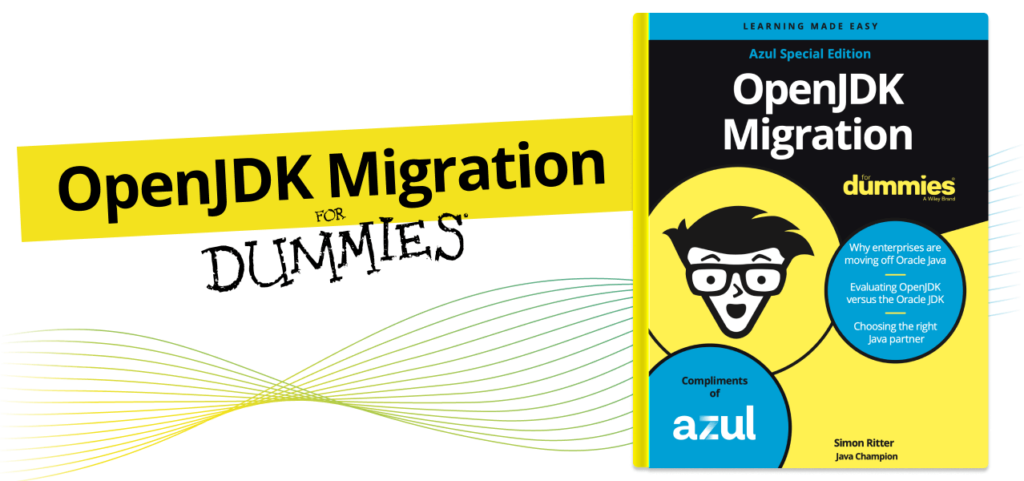
Azul migration experts researched reasons companies choose to not migrate from Oracle Java to an OpenJDK distribution. After careful investigation, they identified seven Oracle OpenJDK migration myths and produced the facts to counter each one.
Myth 1: It is easier to do nothing than to migrate away from Oracle Java. Migration is very expensive and will tie up developer resources. With developers unavailable, your digital transformation efforts like moving to the cloud, adopting DevOps, and implementing agile methodologies will fall behind.
Reality: Negotiating with Oracle paying for Oracle Java support will tie up resources and budgets more than most migrations.
When your organization must decide whether to continue licensing Java from Oracle or to migrate to another Java provider, there are a couple things to consider:
- Oracle’s friendly inquiries into how your company uses Java will become an onerous negotiation
- Adequate preparation can make most Java migrations very straightforward

Negotiating with Oracle will tie up resources
Let’s start with Oracle’s tactics. In How to Avoid Failing a Java Audit and Migrate Your JVMs, a recent webinar with Shawn Donohue of Miro Consulting, Donohue noted that Oracle usually starts its Java investigation with seemingly innocent queries with various people across your organization.
“A lot of times Oracle will call into your organization, but not necessarily the person they’re supposed to call,” Donohue said. “So maybe they’re supposed to call the director of IT, but they won’t look at IT. They’ll call everybody in that IT department who they have the phone number for and see if anybody wants to start talking.”
Start talking about what, you might ask. Start talking about how your organization uses Java. Thinking that they can help Oracle collect information to improve their product and maybe gets some tips from the Java guardians, people are likely to talk. But when your people say your organization uses Oracle Java for certain applications that perform certain functions, Oracle sales reps are likely to hear that your organization has many Oracle Java licenses and many not be paying for all of them.
This is the proverbial foot in the door for Oracle to conduct an audit
Few organizations are equipped with the expert negotiating skills needed to deal effectively with Oracle. And even if you get a good outcome this round, you’ll just be kicking the can of future audits, licensing changes, and price increases down the road. You will also be paying more than you need for support — when you can get the equivalent for typically at least 70% less from the recommended Oracle Java alternative.
Beware the myth of usage-based Java pricing
Did you think you would pay less because you have fewer vCores using Java or fewer employees using Java? In January 2023, Oracle’s fourth Java pricing and licensing change in four years now charges based on the total number of employees in your company, including part-time and contract workers, whether they have a Java license or not. Not every Oracle subscriber is on employee-based pricing yet, but Oracle is converting its subscriber base rapidly.
In addition, it’s not always easy to know whether you’re on a free version of Oracle Java. The most recent Long-Term-Support version is free for a couple years until the next LTS version is released.
Beware the myth of the one-year contract
Many customers say that in the event of an Oracle audit, they plan to sign a one-year contract with Oracle and use that year preparing to move to a different Java provider. ”Well, guess what, there’s no such thing as a one-year contract,” Donohue warns. “The one-year contract is actually a five-year contract that goes all the way back to 2019. And they will ask for five years, you’re going to pay a five years’ worth of price, and you’re only going to get one year going forward. So if your plan is to sit and wait and do nothing, please do not do that.”
You can make Java migrations straightforward
Azul migration experts and our partners have conducted hundreds of migrations, and customers almost always ask how difficult the process will be.
“Behind this question, there is typically an assumption that the migration will be a heavy lift,” Azul Deputy CTO Simon Ritter writes in OpenJDK migration for Dummies. “In fact, migrating to certified builds of OpenJDK can be very straightforward and simple for the vast majority of enterprises. If you’re migrating server applications, you’re not likely to encounter any challenges.”

It would be disingenuous to call migrations simple, but a little preparation can make them go smoothly. Some earl steps to include success include:
Establish goals
There are several reasons why an organization may choose to migrate to an alternative OpenJDK distribution from Oracle. In addition to lowering the total cost of ownership (TCO) of Java apps, frameworks, platforms, and tools, common goals include receiving support for older versions of Java (such as Java 6 or 7) that have reached their end of life, as well as minimizing the impact of a migration on application users and equal or better application performance.
Many organizations poised to migrate wonder how long the process will take. There isn’t a one-size-fits-all answer to that question, though. The time needed for a migration depends on at least half a dozen variables that are specific to your organization. One of those variables is your migration goals; some goals take longer to achieve than others. For example, if your goal is to completely transition off Oracle Java as quickly as possible, you’ll have a different migration plan than an organization that is primarily seeking support for legacy applications running older versions of Java like Java 6 and 7 and would prefer a phased approach over a longer period of time.
Conclusion
Using best practices and a trusted migration partner like Miro Consulting, most of our customers complete their migrations in less than six months. Once the migration is over, they enjoy Azul license and support costs that are typically 70% lower than Oracle.
Azul Zulu JDKs are TCK-compliant and are based on the same source code, Patch Set Updates, Critical Patch Updates, and off-cycle updates and patches as Oracle JDKs. Azul Co-Founder and CTO Gil Tene is an executive committee member on the Java Community Process.
Bust Myths
Discover the myths and the realities.







